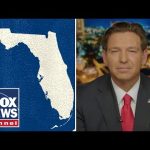In the realm of political intrigue, few stories have gripped the nation quite like the allegations surrounding the Russia collusion hoax. Recently, a prominent figure in Congress discussed the tumultuous aftermath of these claims. The discussion highlighted how early warnings about the supposed collusion emerged in 2016, just as President Trump’s campaign was gaining momentum. Despite extensive investigations, it was ultimately determined that no evidence of collusion existed, leaving many to wonder how this scandal impacted Trump’s presidency and U.S.-Russia relations.
As the winds of political turmoil blew across the nation, the FBI and intelligence agencies were called upon to investigate allegations of election interference. Yet, according to this congressman, their findings unequivocally stated that no collusion had occurred. Instead, what transpired was a series of events that led to the infamous Mueller investigation, which many now regard as a costly and misguided witch hunt. This situation was not just an isolated incident but appeared to be a systematic effort to undermine a duly elected president.
One of the congressman’s notable moments came when he bravely addressed the public about illegal leaks he perceived concerning the investigation. His resolve to bring these issues to light, despite facing backlash from fellow members of Congress, showcased his commitment to transparency and accountability. He recognized that the intelligence community must work diligently to ensure that their powerful positions are not misused. The ramifications of these events were significant, with countless individuals facing reputational damage and legal battles as a result of what many believe was a manufactured narrative.
The congressman also discussed individuals like Carter Page, who unwittingly became a pawn in this political chess game. Page, once an asset for the CIA, found himself in a precarious position during the FISA court proceedings. His case has become emblematic of the broader injustices faced by many who were caught in the crosshairs of this alleged conspiracy. The congressman expressed a desire for accountability rather than vindication, emphasizing the importance of ensuring that such abuses of power do not happen again.
With a new role as chair of the President’s Intelligence Advisory Board, the congressman is championing reforms aimed at preventing future misuse of intelligence agencies. A rapid response team has been established to address issues swiftly, and discussions are taking place regarding the weaponization of these agencies. These proactive measures signal a commitment to restoring trust and integrity within the intelligence community, ensuring that factual intelligence guides decision-making rather than partisan agendas.
As the conversation shifted to current events, the impact of the Russia hoax on U.S. relations with Russia was a key point of focus. The congressman argued that the false narrative has made diplomatic efforts considerably more challenging, particularly with figures like Vladimir Putin. Past administrations have faced difficulties in establishing productive relationships with Russia. The notion of opening diplomatic channels is now clouded by the distrust fostered by years of accusations and investigations.
In closing, the congressman’s reflections paint a picture of a political landscape still grappling with the aftermath of a divisive narrative. His experiences and insights shed light on the complexities of accountability, the necessity of reform, and the importance of rebuilding relationships strained by unfounded allegations. His loyalty to a president who navigated uncharted waters speaks volumes about the resilience required to overcome political adversity. In an age where information often travels at the speed of light, honesty and transparency may just be the best tools to restore faith in governance.




